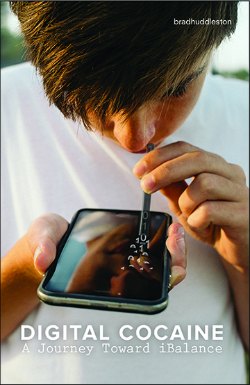Brad Huddleston
Excessive use of digital technology has become the global norm in every age group. This “new normal” is taking us into uncharted psychological waters. Millennials (Generation Y) are those born in the early 1980’s. Their parents remember what it was like to have a “pre-internet brain.” They can recall what it was like to have much less anxiety, stress, and depression. They reminisce about the days of longer attention spans, uninterrupted face to face conversations, and time did not seem to fly by so fast.
Generation Z, the children of the Millennials, cannot relate to their grandparents, often thinking they are out of touch.
The fact is, fMRI scans are showing that our brains are changing, and not for the better.
The word “balance” has become a cliché. I find that most people who use that word concerning their use of digital technologies have never actually measured their time spent looking at screens.
This must change.
As technologies such as virtual and augmented reality continue to advance exponentially, so does the resulting brain stress, and even more so in underdeveloped adolescent brains.
Simply put, our brains are on perpetual overload, and if we continue down this path, we will hit a collective tipping point that will result in digitally induced psychoses that no one on planet earth knows how to treat. We already see the beginning of this dangerous trend.
Technology was supposed to fix the world’s ailing education systems, and yet there are no measurable increases in cognition. The technology manufacturers, of course, would have you think otherwise.
So, what do we do about it?
God never intended for us to be part of the world’s system.
2 Corinthians 6:17 (NKJV) “Come out from them and be separate, says the Lord. Touch no unclean thing, and I will receive you.”
Whenever there is a discussion about holiness, or separation from the world, I think many assume I am talking about no technology use at all. Nothing could be further from the truth. As Christians, we are to abstain from worldliness, not things that are beneficial. Following are suggestions to begin a journey toward true iBalance:
- It is common knowledge that many tech executives in Silicon Valley send their children to non-tech schools, and they agree to severely limit its use in the home until the age of 12. Steve Jobs never allowed his children to use the iPad. I recommend you follow their parenting example.
- 80% of the issues discussed in this article have to do with entertainment technology. Stop all video game playing whatsoever; this includes “education video games.” Instead, play lots of board games with other human beings.
- Eliminate all technology from all bedrooms and sleep a full night.
- Allow no screen time before school and three hours before bed.
- Do not listen to music while studying and sleeping. When a “brain-break” is needed from study or work, do not check email, social media, etc. Instead, listen to two or three songs and then get back to work.
- The truth is, Generation Z’s underdeveloped brains cannot handle smartphones and social media. Not even a little bit. (Many who are older cannot either.)
- Remember what grandma said: too much of a good thing can be bad.
Much more work will be needed to achieve iBalance, but the above suggestions will be a great start to eating the elephant in the room one bite at a time.





